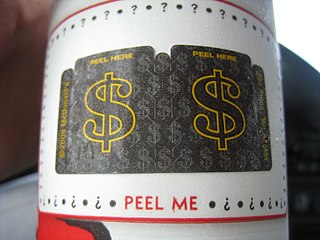| Look up Monopoly , monopoly , or Monopolist in Wiktionary, the free dictionary. |
A monopoly is the situation when there is one only provider of a specific good or service.
Contents
Monopoly may also refer to:
| Look up Monopoly , monopoly , or Monopolist in Wiktionary, the free dictionary. |
A monopoly is the situation when there is one only provider of a specific good or service.
Monopoly may also refer to:

Monopoly is a multi-player economics-themed board game. In the game, players roll two dice to move around the game board, buying and trading properties, and developing them with houses and hotels. Players collect rent from their opponents, with the goal being to drive them into bankruptcy. Money can also be gained or lost through Chance and Community Chest cards, and tax squares. Players receive a stipend every time they pass "Go", and can end up in jail, from which they cannot move until they have met one of three conditions. The game has numerous house rules, and hundreds of different editions exist, as well as many spin-offs and related media. Monopoly has become a part of international popular culture, having been licensed locally in more than 103 countries and printed in more than 37 languages.
Epic commonly refers to:
Kingdom may refer to:
Monopoly game may refer to:
Trump most commonly refers to:
Everything is all that exists.
Kitty or Kittie may refer to:
Target may refer to:
Wizard, the wizard, or wizards may refer to:

The McDonald's Monopoly game is a sales promotion run by fast food restaurant chain McDonald's, with a theme based on the Hasbro board game Monopoly. The game first ran in the U.S. in 1987 and has since been used worldwide.
Monopoly Junior is a simplified version of the board game Monopoly, designed for young children, which was originally released in 1990. It has a rectangular board that is smaller than the standard game and rather than using street names it is based on a city's amusements to make the game more child-friendly. There are many different models of the game.
Defender(s) or The Defender(s) may refer to:
Civil War may refer to:
War is a large-scale armed conflict and the term is used as a metaphor for non-military conflicts.
A dune is a hill of sand.
The Labyrinth is an elaborate maze in Greek mythology.
Sorcery may refer to:
Go, GO, G.O., or Go! may refer to:

The board game Monopoly has its origin in the early 20th century. The earliest known version of Monopoly, known as The Landlord's Game, was designed by an American, Elizabeth Magie, and first patented in 1904 but existed as early as 1902. Magie, a follower of Henry George, originally intended The Landlord's Game to illustrate the economic consequences of Ricardo's Law of Economic rent and the Georgist concepts of economic privilege and land value taxation. A series of board games was developed from 1906 through the 1930s that involved the buying and selling of land and the development of that land. By 1933, a board game had been created much like the modern version of Monopoly sold by Parker Brothers and its related companies through the rest of the 20th century, and into the 21st. Several people, mostly in the midwestern United States and near the East Coast of the United States, contributed to the game's design and evolution.
A Game of Thrones is the first novel in George R. R. Martin's fantasy series A Song of Ice and Fire.